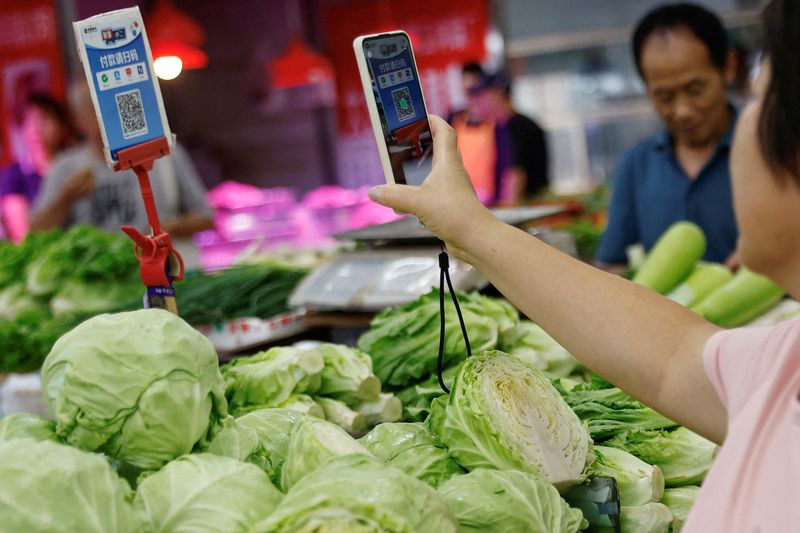By Qiaoyi Li and Ryan Woo
BEIJING (Reuters) -China's consumer inflation accelerated in August to the fastest pace in half a year but the uptick was due more to higher food costs from weather disruptions than a recovery in domestic demand as producer price deflation worsened.
A sputtering start in the second half is mounting pressure on the world's second-largest economy to roll out more policies amid a prolonged housing downturn, persistent joblessness, debt woes and rising trade tensions.
The consumer price index (CPI) rose 0.6% from a year earlier last month, versus a 0.5% rise in July, data from the National Bureau of Statistics (NBS) showed on Monday, but less than a 0.7% increase forecast in a Reuters poll of economists.
Extreme weather this summer from deadly floods to scorching heat has pushed up farm produce prices, contributing to faster inflation.
China's affected crops due to various natural disasters totalled 1.46 million hectares in August, state media reported on Monday.
"The higher CPI in August was due to high temperatures and the rainy weather," NBS statistician Dong Lijuan said in a statement.
Food prices jumped 2.8% on year in August from an unchanged outcome in July, while non-food inflation was 0.2%, easing from 0.7% in July.
"But the rebound was softer than expected and did little to ease deflation concerns. Much of the improvement has been food reflation, which is susceptible to fluctuating weather conditions and capacity changes," said Junyu Tan, North Asia Economist at Coface.
Core inflation, excluding volatile food and fuel prices, was 0.3% in August - the lowest in nearly three and a half years - down from 0.4% in July.
The consumer inflation gauge was up 0.4% month-on-month, compared with a 0.5% increase in July and missing economists' expectations of a 0.5% gain.
China's yuan dipped against the dollar on Monday as long-dated yields hit record lows after monthly inflation data added to economic worries and calls for fresh easing. China stocks ended morning trade lower.
In unusually strong comments, China's ex-central bank governor Yi Gang urged efforts to fight deflationary pressure at the Bund Summit in Shanghai last week.
A national campaign to earmark $41 billion in ultra-long treasury bonds to support equipment upgrades and trade-in of consumer goods has proven lukewarm in spurring consumer confidence, with domestic car sales extending declines for a fourth month in July.
"These policies will take time to filter through, so a demand-led reflation is obviously not yet on the horizon," Tan said.
Meanwhile, the producer price index (PPI) in August slid 1.8% from a year earlier, the largest fall in four months. That was worse than a 0.8% decline in July and below a forecast 1.4% fall.
"The ongoing deflationary pressures boil down into a broader problem of production surplus, which is still outstripping demand," said Tan of Coface.
"We think increased fiscal spending will drive an uptick in domestic demand over the coming months. But government policy is still too skewed toward investment, and so increased fiscal spending may ultimately exacerbate the overcapacity problem," said Gabriel Ng, assistant economist at Capital Economics.

Faltering economic activity has prompted global brokerages to scale back their China 2024 growth forecasts to below the official target of around 5%.
China has room to lower the amount of cash banks must set aside as reserves, a central bank official said on Thursday.